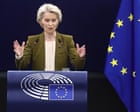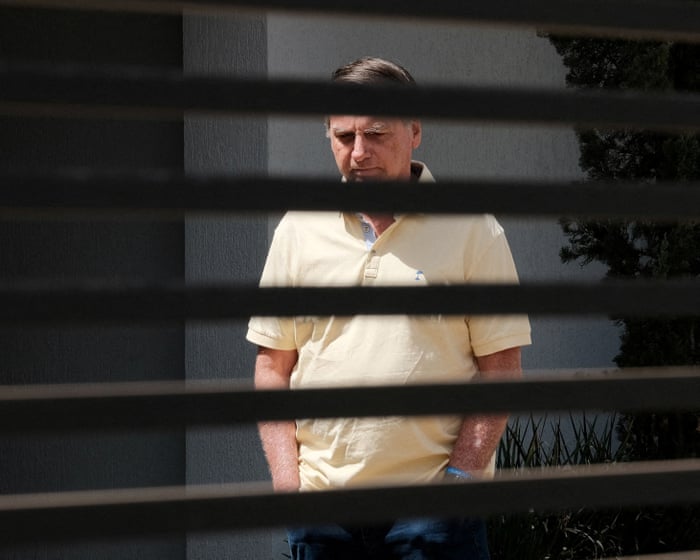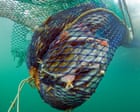Don’t buy any Zohran Mamdani ‘apology’ for smearing the NYPD






Editorial: Mainstream politicians need to better counter the inflammatory arguments on display at the Unite the Kingdom protest

© PA Wire
Political leadership is missing just as Britain needs it most. The government must step up as others stir division and disillusionment grows
Peter Mandelson’s exit from public office in disgrace over his links to the millionaire sex offender Jeffrey Epstein should have been a low point for the government. Instead, it exposed a leadership in trouble, with further to fall. Sir Keir Starmer defended his ambassador after No 10 had seen the emails that sank him. Whether or not the prime minister read them, the damage is becoming institutionalised. Labour looks adrift – consumed by infighting as darker forces gather beyond Westminster.
At the weekend, more than 110,000 marched through London in Britain’s largest far-right rally in decades. Organised by Stephen Yaxley-Lennon, also known as Tommy Robinson, and billed as a “festival of free speech”, it quickly descended into conspiracy theories, Islamophobia and anti-migrant bigotry. There was violence: 26 police officers were injured. Stirring the pot was the far-right billionaire Elon Musk, dialling in via video link, who called for the dissolution of parliament and incited violence; the French rightwinger Éric Zemmour pushed the “great replacement” lie – a white nationalist myth of engineered demographic change. Maga hats, US flags and “Send them home” signs made it feel more Mar-a-Lago than Millbank.
Do you have an opinion on the issues raised in this article? If you would like to submit a response of up to 300 words by email to be considered for publication in our letters section, please click here.
Continue reading...
© Photograph: Joao Daniel Pereira/ZUMA Press Wire/Shutterstock

© Photograph: Joao Daniel Pereira/ZUMA Press Wire/Shutterstock

© Photograph: Joao Daniel Pereira/ZUMA Press Wire/Shutterstock
The European Commission president, Ursula von der Leyen, is right about the challenges Brussels faces. Far more ambition is required if they are to be met
Delivering her state of the union address in Brussels last week, the European Commission president, Ursula von der Leyen, painted a grim but accurate picture of the challenges faced by Europe as the first quarter of the 21st century draws to a close. “A world of imperial ambitions and imperial wars,” she noted, is “a world in which dependencies are ruthlessly weaponised. And it is for all of these reasons that a new Europe must emerge.”
Few would quibble with that analysis. As Ms von der Leyen spoke, the news that Nato aircraft had shot down Russian drones over Poland graphically underscored her point. In an era of great power rivalry in which the United States has become an unreliable ally, there is an emerging consensus that the European Union must be more robust in defending its own interests and championing its own values.
Continue reading...
© Photograph: Ronald Wittek/EPA

© Photograph: Ronald Wittek/EPA

© Photograph: Ronald Wittek/EPA
Editorial: The Independent has pledged not to look away from Gaza – we will continue to report the truth as we see it

© Nedal Hamdouna
Though the far-right former president has been held accountable for overseeing the plot, supporters at home and abroad still rally to his cause
A populist president refused to accept his defeat at the ballot box, insisting that the election had been stolen. A far-right mob stormed the country’s institutions in his support. Yet democracy prevailed. And then, on Thursday, Brazil’s supreme court sentenced the former president Jair Bolsonaro to 27 years in prison for leading a criminal conspiracy to overturn the 2022 elections and “annihilate” democracy through a coup. The sprawling plot was both modern and crudely old school – extending from an online disinformation campaign to undermine faith in the voting system, to aborted plans to assassinate the newly elected president Luiz Inácio Lula da Silva, known as Lula, and the supreme court justice investigating Bolsonaro. It culminated in the riots in Brasília in January 2023.
Four of the five judges on the panel found Bolsonaro guilty. Seven close allies from the military and security establishment were convicted alongside him for the same crimes – including his former defence and justice ministers, former spy chief, generals and the former navy commander. According to the prosecution, the plans for a putsch failed because the army and air force chiefs refused to take part.
Do you have an opinion on the issues raised in this article? If you would like to submit a response of up to 300 words by email to be considered for publication in our letters section, please click here.
Continue reading...
© Photograph: Diego Herculano/Reuters

© Photograph: Diego Herculano/Reuters

© Photograph: Diego Herculano/Reuters
Sea life needs protection, and the UK’s current system of marine management isn’t up to it
Up to 90% of the ocean floor around Britain is covered with sand and gravel, derived from the erosion of shell and rocks. Other, more unusual habitats include maerl beds, seagrass meadows and kelp forests. These biodiverse landscapes are home to 330 species of fish, as well as seals, seahorses and thousands of lesser‑known species – which share them with the offshore energy, fishing and shipping industries.
Heightened awareness of pollution from sewage and plastics means that the public knows more about marine conservation than it used to. For his 99th birthday this year, the broadcaster and naturalist Sir David Attenborough made a film, Ocean, in which he described the seas as the planet’s “greatest life support system”, and urged people to get behind efforts to protect and renew marine nature.
Do you have an opinion on the issues raised in this article? If you would like to submit a response of up to 300 words by email to be considered for publication in our letters section, please click here.
Continue reading...
© Photograph: Colin Munro/Alamy

© Photograph: Colin Munro/Alamy

© Photograph: Colin Munro/Alamy
Editorial: The sacking of Lord Mandelson has been another humiliation, and doubts about the prime minister’s leadership have begun to embolden his rivals – but the political battle is still far from lost

© Dave Brown
Editorial: It is tempting – but wrong – to see the sacked ambassador to Washington as a tragic figure. Now, questions must be asked about the judgement of the prime minister who approved him for the prestigious role

© Dave Brown
The shooting of the Turning Point USA co-founder should not be used to foment further division in a polarised country
“Democracy is the way that we have diverse societies that don’t kill each other, largely,” Lilliana Mason, a leading scholar of partisanship, observed recently. She added: “As soon as we stop believing in it, it disappears.” Dr Mason’s own research suggests that there is sharply rising tolerance of political violence. On Wednesday, it claimed one more victim.
The shocking killing of the co-founder of Turning Point USA Charlie Kirk, a hugely influential activist who rallied young people to Donald Trump’s cause and far-right ideology more broadly, has been widely and rightly condemned across the political spectrum. Leading Democrats and progressive activists made clear that such violence must not be tolerated.
Do you have an opinion on the issues raised in this article? If you would like to submit a response of up to 300 words by email to be considered for publication in our letters section, please click here.
Continue reading...
© Photograph: Phill Magakoe/AFP/Getty Images

© Photograph: Phill Magakoe/AFP/Getty Images

© Photograph: Phill Magakoe/AFP/Getty Images
Any association with Jeffrey Epstein was obviously toxic and it reflects poorly on Keir Starmer’s judgment that he didn’t anticipate the risk
As UK ambassador to Washington, Peter Mandelson was obviously a risky appointment. There was never any doubt that the former cabinet minister, European commissioner and international business lobbyist would be a skilled operator. The danger came from another of his reliable traits – attracting attention for the wrong reasons.
Sure enough, little over six months into the role, Lord Mandelson’s position became untenable. Sir Keir Starmer had stood by him when links to Jeffrey Epstein first resurfaced – extraordinary given the billionaire financier’s status as a convicted paedophile. The position changed with the publication of evidence showing that Lord Mandelson reaffirmed the friendship even after Epstein’s conviction, expressing solidarity and urging him to seek early release.
Do you have an opinion on the issues raised in this article? If you would like to submit a response of up to 300 words by email to be considered for publication in our letters section, please click here.
Continue reading...
© Photograph: Roger Askew/Shutterstock

© Photograph: Roger Askew/Shutterstock

© Photograph: Roger Askew/Shutterstock

© Doug Mills/The New York Times

© Illustration by Rebecca Chew/The New York Times